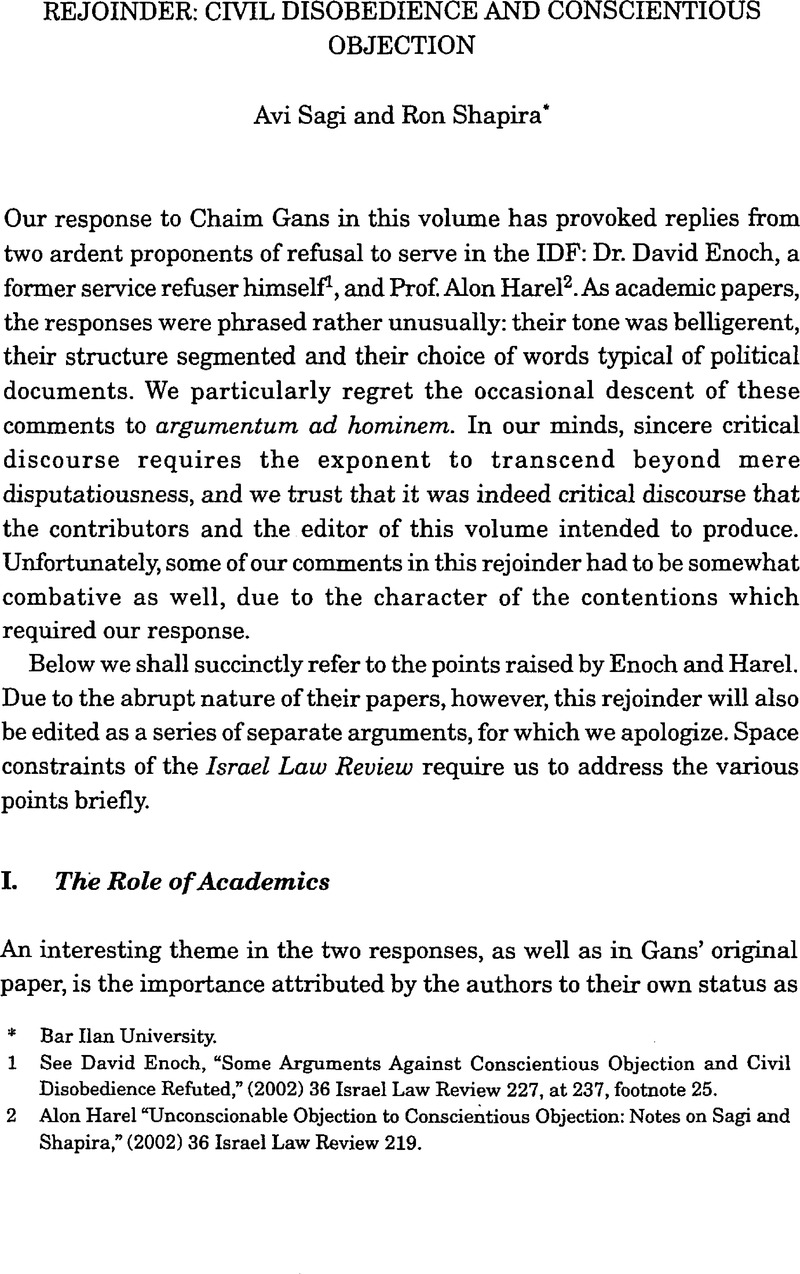No CrossRef data available.
Published online by Cambridge University Press: 04 July 2014

1 See Enoch, David, “Some Arguments Against Conscientious Objection and Civil Disobedience Refuted,” (2002) 36 Israel Law Review 227, at 237, footnote 25CrossRefGoogle Scholar.
2 Harel, Alon “Unconscionable Objection to Conscientious Objection: Notes on Sagi and Shapira“(2002) 36 Israel Law Review 219CrossRefGoogle Scholar.
3 Enoch, supra n. 1, at 253: “We should ask ourselves how seriously wrong the occupation is, and – perhaps more specifically – whether it is in violation of the very normative considerations that purportedly ground the general duty to obey the law. If the occupation is sufficiently seriously wrong (as I think it is), and if it is in violation of the ideals of fair compromise and equal distribution of political power (as I think it undeniably is), then there remains no sound moral objection to such acts of refusal based on their illegality. As already mentioned, the failure of some influential objections to current Israeli cases of refusal cannot by itself establish that such refusal is morally justified. But the fact that commentators choose to focus on such objections rather than on the moral status of the occupation… should perhaps give some reason to suspect that no plausible case against such refusal can be made because they are, well, perfectly justified.”
4 Enoch, supra n. 1, at 230–231.
5 Ibid, at 228, footnote 3.
6 Ibid, at 229, footnote 5.
7 Ibid, at 252: “I am willing to concede that the mere immorality of the occupation does not alone suffice to justify refusing to participate in it. To do that, the occupation must be seriously immoral, sufficiently immoral to defeat the reasons we usually have – if indeed we have such moral reasons – to obey the law…. For the refusal to take part in the occupation to be morally justified the features of the occupation that make it morally wrong must be serious enough to outweigh the considerations that (sometimes) support a moral duty to obey the law.”
8 Harel, supra n. 2.
9 Ibid, at 223–224.
10 Enoch, supra n. 1, at 236.
11 Ibid, at 236–238.
12 Ibid, at 236–237.
13 Ibid, at 237.
14 Ibid, at 237.
15 The reservation purported by the adverb “probably” is entailed by the ambiguity of these assertions.
16 Enoch, supra n. 1, at 237.
17 sagi, Avi and Shapira, Ron, “Civil Disobedience and Conscientious Objection,” (2002) 36 Israel Law Review 181, at 201–212Google Scholar.
18 Enoch, supra n. 1, at 247–248.
19 Ibid, at 247–248.
20 See Sagi and Shapira, supra n. 17, at 209.
21 Enoch, supra n. 1, at 245–246.
22 See Gans, Chaim, “Right and Left: Ideological Disobedience in Israel,” (2002) 36 Israel Law Review 19, at 53–54CrossRefGoogle Scholar.
23 Enoch, supra n. 1, at 247–248.
24 Ibid, at 248, footnote 57.
25 Ibid.